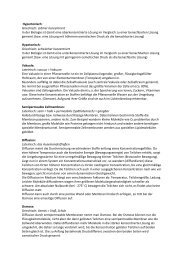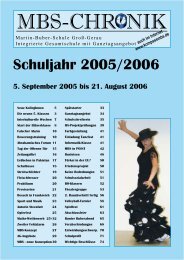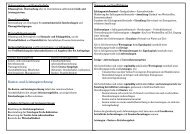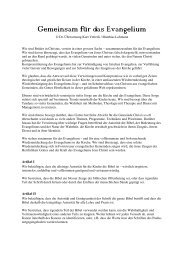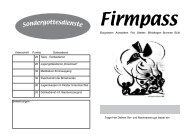Wie gut verstehen Berater ihre Kunden? Ich-Entwicklung - ein ...
Wie gut verstehen Berater ihre Kunden? Ich-Entwicklung - ein ...
Wie gut verstehen Berater ihre Kunden? Ich-Entwicklung - ein ...
Sie wollen auch ein ePaper? Erhöhen Sie die Reichweite Ihrer Titel.
YUMPU macht aus Druck-PDFs automatisch weboptimierte ePaper, die Google liebt.
130 Thomas Binder<br />
Literatur<br />
Basseches, M. (1997). A developmental perspective on psychotherapy process,<br />
psychotherapists' expertise, and »meaning-making-conflict« within therapeutic<br />
relationships: A two-partseries. Journal ofAdult Development, 4, 17 - 33<br />
and 4 (2), 85 -106.<br />
Basseches, M., Mascolo, M. F. (2009). Psychotherapy as a developmental process.<br />
New York: Routledge.<br />
Binder, T. (2007a). Piagets Erbe für die Wirtschaft: <strong>Entwicklung</strong>spsychologische<br />
Managementdiagnostik. Wirtschaftspsychologie Aktuell, 14 (2), 56 - 58.<br />
Binder, T. (2007b). Ego development and its implications for the business world.<br />
Presentation, European Conference on Developmental Psychology, Jena.<br />
Binder, T., Kay, J. (2008). Was hätte Jean Piaget beim Thema Führungskräfteentwicklung<br />
anders gemacht? Vortrag, 7. Kongress für Wirtschaftspsychologie,<br />
Fellbach.<br />
Borders, L. D. (1989). Developmental cognitions offirst practicum supervisees.<br />
Journal of counselling psychology, 36, 163 - 169.<br />
Borders, L. D., Fong, M. L., Neimeyer, G. J. (1986). Counseling students' level<br />
of ego development and perceptions of clients. Counselor Education and<br />
Supervision, 26, 36-49.<br />
Borders, L. D., Fong, M. L. (1989). Ego development and counseling ability<br />
during training. Counselor Education and Supervision, 29, 71-83.<br />
Bradford, D. L., Allan, R. C. (1998). Power up. Transforming organizations<br />
through shared leadership. Hoboken, N.Y.: Wiley.<br />
Bushe, C. R., Gibbs, B. W (1990). Predicting organization development consulting<br />
competence from the Myers-Briggs Type Indicator and stage of ego<br />
development. The Journal of Applied Behvioral Science, 26 (3), 337-357.<br />
Carlozzi, A. E, Gaa, J. P, Lieberman, D. B. (1983). Empathy and ego development.<br />
Journal of Counseling Psychology, 30, 113 -116.<br />
Carlson, v., Westenberg, P. M. (1998). Cross-cultural applications of the<br />
WUSCT. In J. Loevinger (Ed.), Technical foundations for measuring ego<br />
development (pp. 57 -75). Mahwah, NJ: Lawrence Erlbaum.<br />
Cook-Greuter, S. R. (1999). Postauronomous ego development. A study of its<br />
nature and measurement. Unpublished dissertation, Harvard University.<br />
Coole-Greuter, S. R. (2004). Making the case for a developmental perspective.<br />
Industrial and Commercial Training, 36 (7), 275-281.<br />
Corbett, R. P. (1995). Managerial style as a function ofadult development stage.<br />
Unpublished dissertation, University of Massachusetts Amherst.<br />
Costa, P. T. Jr., McCrae, R. R. (1993). Ego development and trait models of<br />
personality. Psychological Inquity: An International Journal of Peer Commentary<br />
aud Review, 4, 20-23.<br />
<strong>Wie</strong> <strong>gut</strong> <strong>verstehen</strong> <strong>Berater</strong> <strong>ihre</strong> <strong>Kunden</strong>?<br />
131<br />
DAndrea, M., Daniels, J. (2001). Group pacing: A developmental eclectic approach<br />
to groupwork.Journal ofCounseling&Development, 72, 585-590.<br />
Döbert, R., Habermas, J. , G. Nunner-Winkler (Hrsg.) (1977). <strong>Entwicklung</strong> des<br />
<strong>Ich</strong>s. Köln: Kiepenheuer & Witsch.<br />
Hauser, S. (1976). Loevinger's model and measure ofego development: A critieal<br />
review, Psychological Bulletin, 83 (5), 928-955.<br />
Kegan, R. (1994). Die <strong>Entwicklung</strong>sstufen des Selbst. Fortschritte und Krisen im<br />
menschlichen Leben. München: Kindt.<br />
Kegan, R. (1998). In over our heads. The mental demands of modern life.<br />
Cambridge: Harvard University Press.<br />
Kegan, R., Lahey, L. (2009). Immunity to change. How to overcome it and<br />
unlock the potential in yourself and your organization. Boston: Harvard<br />
Business Press.<br />
Kohlberg, L., Mayer, R. (1972). Development as the aim ofeducation. Harvard<br />
Education Review, 42, 449-496.<br />
Laske, O. (2006). Why does your maturity matter? How developmental theory<br />
impacts your coaching competence. Choice. The Magazine for professional<br />
Coaching, 4 (3), 10-13.<br />
Loevinger, J. (1976). Ego development. Conceptions and theories. San Francisco:<br />
Jossey-Bass.<br />
Loevinger, J. (1980). Some thoughts on ego development and counseling. The<br />
personnel and guidance journal, 58 (5), 389-390.<br />
MacAuliffe, G., LovelI, C. (2006). The influence ofcounselor epistemology on<br />
the helping interview: A qualitative study. Journal of Counseling and Development,<br />
84, 308-317.<br />
Manners, J., Durkin, K. (2000). Processes involved in adult development: A<br />
conceptual framework. Developmental Review, 20, 475 - 513.<br />
Manners, J., Durkin, K. (2001). A critical review of the validity of ego development<br />
theory and its measurement. Journal of Personality Assessment, 77,<br />
541-567.<br />
McCallum, D. C. (2008). Exploring the implications oE a hidden diversity in<br />
group relations conference learning: A developmental perspective. Unpublished<br />
dissertation. Columbia University.<br />
Merron, K. (1985). The relationship between ego development and managerial<br />
effectiveness under conditions ofhigh uncertainty. Unpublished dissertation.<br />
Harvard University.<br />
Piaget, J. (2003). M<strong>ein</strong>e Theorien der geistigen <strong>Entwicklung</strong>. W<strong>ein</strong>heim: Beltz.<br />
Quinn, R., Torbert, W R. (1987). Who is an effective transforming leader?<br />
Unpublished paper, University of Michigan, School of Business.<br />
Raviv, N. (1989). Psychotherapy training. Ego and professional development of<br />
trainees and supervisors. Unpublished Dissertation. Northwestern Univer<br />
sity.<br />
Rooke, D., Torbert, W R. (1998). Organizational transformation as a function







